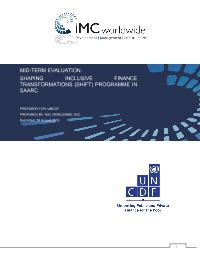
Mid-term Evaluation of the Shaping Inclusive Finance Transformations Programme SAARC Region
The Shaping Inclusive Finance Transformations (SHIFT) in the South Asian Association for Regional Cooperation (SAARC) programme is a regional market development initiative implemented by the United Nations Capital Development Fund’s (UNCDF) Financial Inclusion Practice Area (FIPA). The programme seeks to stimulate investment, business innovations and regulatory reform to bring about lasting changes for low-income people. Specifically, it aims to expand economic participation of and opportunities for women and small and growing businesses to be active agents in the formal economy. By 2021, it aims to have enabled “at least one million low-income people, 65% of whom are women, and 30,000 small and growing businesses to access and use financial services to secure opportunities for employment, enterprise development, and increased sustainable consumption.The programme design anticipated that SHIFT in SAARC would address both demand and supply-side constraints in interlinked financial markets, working primarily through financial service providers (FSPs).
As a regional programme, SHIFT in SAARC aims to eventually take advantage of regional-level policy and cooperation processes, to leverage multi-country perspectives and achieve synergies in policy advocacy. At the time of this evaluation, the programme has only implemented activities in Bangladesh.
The SHIFT in SAARC programme has benefited from three sources of funding as of the mid-term evaluation; The European Union (EU), The Bill and Melinda Gates Foundation (BMGF), and internal UNCDF core funding. As described in the full report, the BMGF reduced its commitment during programme implementation. The total committed contribution to the programme was initially USD 9,284,227. At the end of 2018, the revised committed contribution from all three sources was USD 7,604,777, and actual expenses against that commitment amounted to USD 4,019,190.


